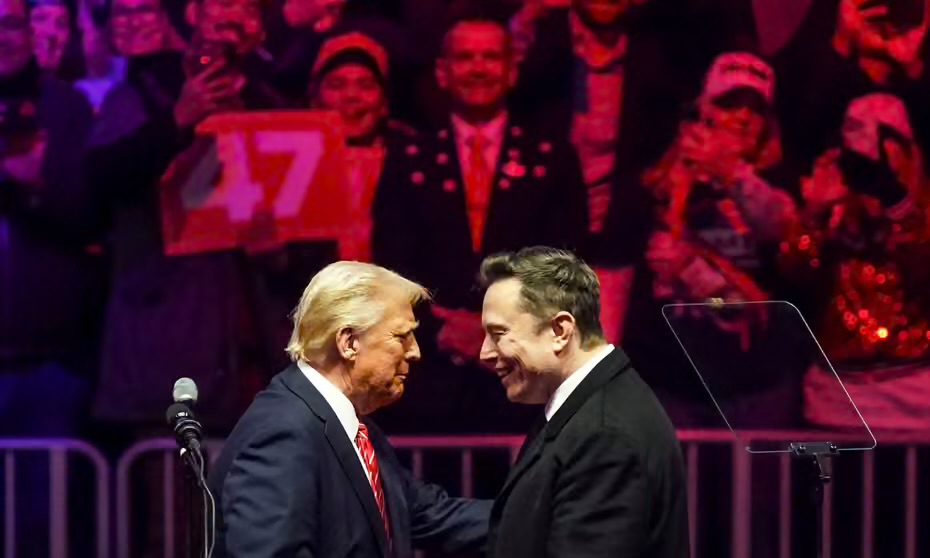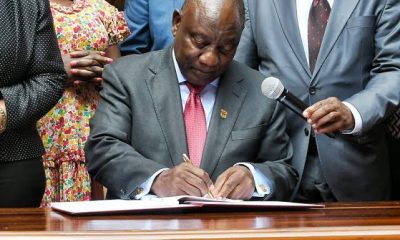Africa
FACTBOX – What is South Africa’s Land Law That Triggered Trump’s Threats?
Recently adopted Expropriation Act is ‘not a confiscation instrument,’ says government

South Africa is the latest country to find itself in the crosshairs of the new US administration, with President Donald Trump saying he will cut all funding to the country over what he claims are “massive” human rights violation against white people due to a new land expropriation law.
“South Africa is confiscating land, and treating certain classes of people VERY BADLY. It is a bad situation that the Radical Left Media doesn’t want to so much as mention. A massive Human Rights VIOLATION, at a minimum, is happening for all to see,” Trump stated on his Truth Social platform.
Billionaire entrepreneur Elon Musk, who was born and raised in South Africa and is now one of Trump’s closest allies, also weighed in, sharing a post on X that claimed South African farmers were in “grave danger” following the bill’s approval.
His repost further suggested that “South Africa steadily becomes communist.” Separately, Musk accused South African President Cyril Ramaphosa of implementing “openly racist ownership laws.”
The South African government has rejected Trump’s criticism of the new law, which it said is essentially aimed at addressing the disparities created by decades of apartheid and white minority rule in South Africa that was ended in 1994.
What is the law?
During the apartheid era, the Black majority in South Africa was oppressed in all possible ways, including housing and land ownership.
But decades after the end of the racist system of apartheid, most private farmland in South Africa is still owned by white people, something that Ramaphosa and the ruling African National Congress (ANC) have sought to address.
The new law, the government has emphasized, is a way to right historic wrongs.
The new Expropriation Act, which replaces the apartheid-era Expropriation Act of 1975, was officially signed into law by Ramaphosa on Jan. 23 after nearly five years of public consultation and parliamentary debate.
The legislation outlines the legal framework for the government to expropriate private property for public purposes or in the public interest, setting rules for how compensation should be determined.
While the act generally mandates fair compensation, it also allows for certain cases in which no compensation may be paid, provided it is deemed just and reasonable.
According to the South African parliament, local, provincial, and national authorities will have the power to enforce this law to acquire land for a variety of purposes, including infrastructure development, public services, and land reform. However, the bill explicitly states that expropriation cannot occur arbitrarily or for reasons beyond serving the public good.
A long history of land inequality
Land reform has long been a contentious issue in South Africa, where historical injustices have left the majority Black population with little land ownership despite the official end of apartheid in 1994.
During the colonial and apartheid eras, laws such as the Natives Land Act of 1913 severely restricted Black South Africans from owning or leasing land. The result was widespread dispossession that concentrated land ownership in the hands of the white minority.
Although apartheid officially ended three decades ago, land ownership remains highly skewed, with white farmers still controlling much of the country’s arable land.
The new Expropriation Act is seen as an attempt to address these historical disparities. Deputy Public Works and Infrastructure Minister Sihle Zikalala described the bill as the culmination of a long struggle against land dispossession.
“This is a culmination of the long history of struggle waged by the forbearers against the dispossession of the majority of Black people through the 1913 Land Act and the notorious Group Areas Act,” Zikalala said following the adoption of the bill.
He added that the legislation aims to rectify past injustices without destabilizing the country’s economy.
“The unequal distribution of land and the tendency by some greedy individuals to use land to impede the country’s development prospects will be a thing of the past. As the President indicated, the legislation will be implemented without destabilizing the economic and development prospects of the country.”
However, some critics argue that the bill does not focus specifically on land redistribution to historically disadvantaged communities. Rural Development and Land Reform Minister Mzwanele Nyhontso remarked that the bill is more about public works than land justice.
“This bill has little to do with land reform,” Nyhontso said, explaining that its primary function is to allow the government to expropriate land for public use rather than specifically redistributing it to marginalized communities.
What has been South Africa’s response?
Opposition to the Expropriation Bill has come from various groups, both inside and outside South Africa. Critics argue that the legislation could lead to government overreach, diminish property rights, and create economic uncertainty, potentially deterring investment in the country.
Trump’s recent statements are not his first criticisms of South Africa’s land policies. In 2018, while serving as president, he tweeted that he had directed his secretary of state to “closely study the South Africa land and farm seizures and expropriations and the large scale killing of farmers.” He cited conservative commentator Tucker Carlson’s claims that South Africa was seizing land from white farmers.
At the time, Ramaphosa fired back, urging Trump to stay out of South Africa’s affairs. “He was not present when Black people faced apartheid and oppression,” Ramaphosa said, dismissing Trump’s allegations as uninformed.
In response to Trump and Musk’s claims, the South African government has firmly rejected the notion that the new law constitutes land confiscation or that it targets any particular racial group unfairly.
A statement from Ramaphosa’s office on Monday emphasized that the law is a constitutional mechanism designed to ensure equitable land access.
“The recently adopted Expropriation Act is not a confiscation instrument, but a constitutionally mandated legal process that ensures public access to land in an equitable and just manner as guided by the constitution,” the statement read.
Furthermore, Pretoria clarified that US funding to South Africa is largely focused on HIV/AIDS prevention programs, implying that Trump’s threat to cut funding would not significantly impact the nation’s economic stability.
Kenya Insights allows guest blogging, if you want to be published on Kenya’s most authoritative and accurate blog, have an expose, news TIPS, story angles, human interest stories, drop us an email on [email protected] or via Telegram
-

 Grapevine1 week ago
Grapevine1 week agoAlleged Male Lover Claims His Life Is in Danger, Leaks Screenshots and Private Videos Linking SportPesa CEO Ronald Karauri
-

 Lifestyle2 weeks ago
Lifestyle2 weeks agoThe General’s Fall: From Barracks To Bankruptcy As Illness Ravages Karangi’s Memory And Empire
-

 Grapevine4 days ago
Grapevine4 days agoRussian Man’s Secret Sex Recordings Ignite Fury as Questions Mount Over Consent and Easy Pick-Ups in Nairobi
-

 Investigations2 weeks ago
Investigations2 weeks agoEpstein Files: Sultan bin Sulayem Bragged on His Closeness to President Uhuru Then His Firm DP World Controversially Won Port Construction in Kenya, Tanzania
-

 Business2 weeks ago
Business2 weeks agoKRA Can Now Tax Unexplained Bank Deposits
-

 Investigations1 week ago
Investigations1 week agoEpstein’s Girlfriend Ghislaine Maxwell Frequently Visited Kenya As Files Reveal Local Secret Links With The Underage Sex Trafficking Ring
-

 News1 week ago
News1 week agoState Agency Exposes Five Top Names Linked To Poor Building Approvals In Nairobi, Recommends Dismissal After City Hall Probe
-

 Investigations23 hours ago
Investigations23 hours agoMulti-Million Dollar Fraud: Three Kenyans Face US Extradition in Massive Cybercrime Conspiracy


















